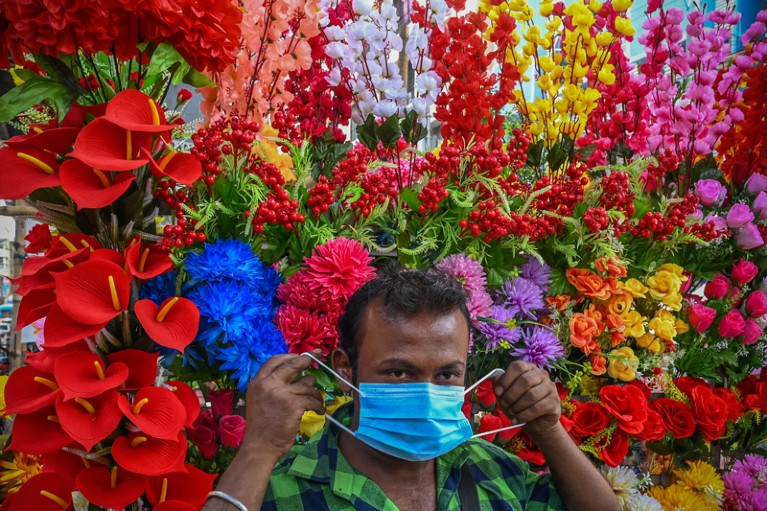[ad_1]
Hello Nature readers, would you like to get this Briefing in your inbox free every day? Sign up here

Further waves of SARS-CoV-2 are expected as new variants spread.Credit: Dibyangshu Sarkar/AFP/Getty
The current crop of immunity-dodging offshoots of the Omicron variant of SARS-CoV-2 is unprecedented in its diversity, making it harder to predict coming waves of infection. In Europe, North America and Africa, the prevalence of Omicron offshoots in the BQ.1 family is rising quickly, even as overall cases seem to fall. In Asian countries including Singapore, Bangladesh and India, a lineage called XBB has already set off fresh waves of infection. Scientists are closely watching several regions where both are circulating, to see which has the edge. “In the end, probably, some variants are going to dominate, but it’s less decisive than it was in the past,” says computational biologist Cornelius Roemer.
The US Supreme Court will hear oral arguments next week in two cases that will determine whether Harvard University and the University of North Carolina at Chapel Hill are allowed to use race as a factor in deciding which students they admit. The court’s decision could mean that academic institutions across the United States will no longer be allowed to use ‘affirmative action’ policies to shape their student bodies. Research has shown that, without affirmative action, some universities — particularly top-tier institutions that enrol only a small fraction of applicants — will struggle to admit students from a wide variety of backgrounds.
A proposed change to conservation rules in the United States could expand the use of a controversial tool to save species on the brink of extinction. Assisted migration, in which an endangered species is relocated to a new environment, is a last resort for organisms being squeezed out of their historic ranges by climate change, habitat loss and threats from introduced species. But fears of unintended ecological consequences have limited its use so far. The US Fish and Wildlife Service is set to relax assisted-migration regulations, to allow experimental relocations outside a species’ current or recent range. Regulators “need to seriously consider conservation actions that are currently deemed too extreme”, says conservation biologist Avril Harder.
Yale Environment 360 | 12 min read
Features & opinion
Researchers are harnessing artificial intelligence (AI) to help them to analyse and write scientific papers, generate code and brainstorm ideas. Large language models — such as GPT-3, developed by research laboratory OpenAI — can help to parse, and even produce, human-readable text. For example, computer scientist Mina Lee uses an AI-powered writing assistant called Wordtune. “I write a paragraph, and it’s basically like a doing brain dump,” she says. “I just click ‘Rewrite’ until I find a cleaner version I like.”
In the United States, COVID-19 has disproportionately affected Black, Hispanic and Native American people, compared with white people — and this disparity has appeared across the world. This episode of the Nature Podcast explores the complex tale behind this inequality — including a reading list of sources that illustrate the myriad issues.
Nature Podcast | 40 min listen
Subscribe to the Nature Podcast on Apple Podcasts, Google Podcasts or Spotify.
[ad_2]
Source link

